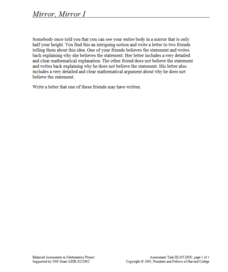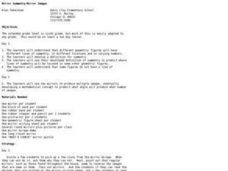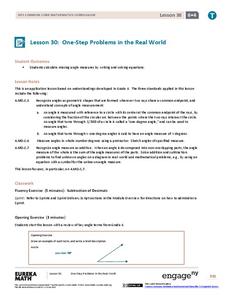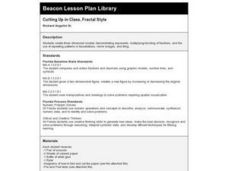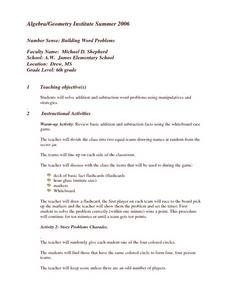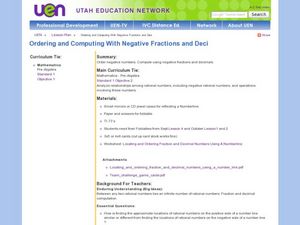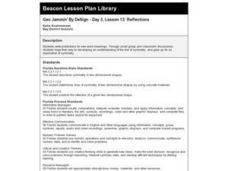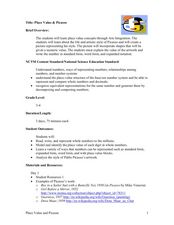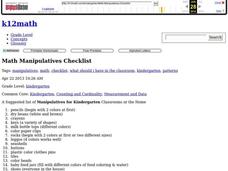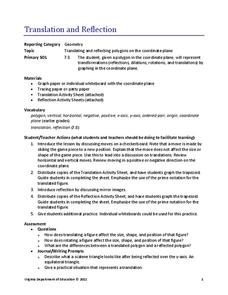Concord Consortium
Mirror, Mirror I
How do you see yourself? Young mathematicians consider whether it's possible to view their whole bodies in a mirror with a length that is half their height. They write a letter to a friend explaining their positions mathematically.
Curated OER
Backwards Writing: Reflections and Symmetry
Why is "ambulance" written backwards on emergency vehicles? Young geometers apply principles of symmetry to translate words written backwards. See if your school or district subscribes to Jobland, where you can view a clip that explains...
Balanced Assessment
Writing and Sketching Resource
Picture this—the class creates pictures using functions. Here, learners build functions to model specific graphic criteria. They use their knowledge of parent functions and transformations to create the perfect function.
Curated OER
Mirror Symmetry/Mirror Images
Students explore lines of symmetry in geometric shapes. In this geometry lesson plan, students construct angles using mirrors and rubberbands, then predict the number of images that will appear in the reflection. Students reproduce lines...
Curated OER
Transformations in the Coordinate Plane
Your learners connect the new concepts of transformations in the coordinate plane to their previous knowledge using the solid vocabulary development in this unit. Like a foreign language, mathematics has its own set of vocabulary terms...
EngageNY
One-Step Problems in the Real World
Mirror, mirror on the wall, which is the fairest resource of them all? Individuals write and solve one-step equations for problems about angle measurement, including those involving mirrors. Both mathematical and real-world problems are...
Curated OER
Geo Jammin' By DeSign - Day 3, Lesson 14: Mirror, Mirror on the Wall
Learners explore characteristics of symmetry, write a definition, and locate the line of symmetry on a shape.
Curated OER
Mirror, Mirror on the Wall, Who Needs Math in Life at All?
Students think and talk about the ways in which they use math throughout the day. They add each way to a "math in real life" bulletin board and reflect in writing on the ways they use math.
Curated OER
Symmetry
Is this the line of symmetry? Scholars analyze 12 images to determine whether or not the dotted line in each reflects symmetry. There are three examples for them to reference before they start, so consider reviewing these together before...
Curated OER
Countdown Challenge: Similarity
In this similarity learning exercise, students use similar rectangles to find the length of a diagonal. They use symbols and write paragraphs to explain the problem. This one-page learning exercise contains one similar problem with 13...
Curated OER
Line Symmetry
Teach your class about symmetry lines with this resource. This activity defines symmetry and explains lines of symmetry and how they work. Learners examine a variety of examples before drawing lines of symmetry in 5 figures. The activity...
Curated OER
Cutting Up in Class, Fractal Style
Students create three-dimension models demonstrating exponents, multiplying and dividing of fractions, and the use of repeating patterns in tessellations, mirror images, and tiling.
Curated OER
Perimeter Word Problems
In this perimeter worksheet, students complete a set of 10 word problems, writing given information, determining that they are looking for and calculating. A reference web site is given for additional activities.
Curated OER
Building Word Problems
Sixth graders study addition and subtraction facts. In equal groups, they play a race game to correctly solve addition and subtraction problems. Using a PowerPoint presentation, the teacher demonstrates how to write word problems and...
Curated OER
Symmetry
Students examine the concept of symmetry. They use photographs in front of a mirror to see symmetry. They write an explanation or drawing of how a mirror always produces a line of symmetry.
Curated OER
Ordering and Computing with Negative Fractions and Decimals
Seventh graders explore the concept of computing negative fractions and decimals. In this negative fractions and decimals lesson, 7th graders compare ordering positive fractions to ordering negative fractions. Students use mirrors to see...
Curated OER
Geo Jammin' By DeSign - Day 3, Lesson 13: Reflections
Pupils use current knowledge to predict the meaning of line of symmetry. They explore symmetry using mirrors.
Curated OER
What's Your Expression
First graders explore facial expressions in a mirror and create drawings of people with a facial expression of their choice. They graph the facial expressions drawn.
Curated OER
Place Value & Picasso
Place value to the millions is the focus of this math lesson plan. Third and fourth graders investigate multiple ways to represent a number. They examine place value while studying factual information about Pablo Picasso. Resources are...
Mathematics Vision Project
Module 6: Congruence, Construction, and Proof
Trace the links between a variety of math concepts in this far-reaching unit. Ideas that seem very different on the outset (like the distance formula and rigid transformations) come together in very natural and logical ways. This...
Curated OER
Lines of Symmetry, Shapes and Symbols
Which shapes are symmetrical? Third graders decide which shapes have lines of symmetry, and which shapes are not symmetrical. They work on 13 shapes and symbols, four of which have lines already drawn through them. Use this resource to...
Curated OER
Factor Pairs
This presentation covers a lot of ground. Square numbers, metal math computations, commutative property, ordering positive and negative integers, factoring, and real world problem solving are all covered. Use over the course of several...
Curated OER
Patterns
Explore early algebra by participating in a pattern identification activity using a random assortment of different household materials. The class creates, completes, and analyzes different patterns with the help of leggos, buttons,...
Virginia Department of Education
Translation and Reflection
Bring about the change you want to see in the world or at least in your lesson plans. Young mathematicians learn about translation and reflections by applying them to polygons on the coordinate plane. Results provide data to...
